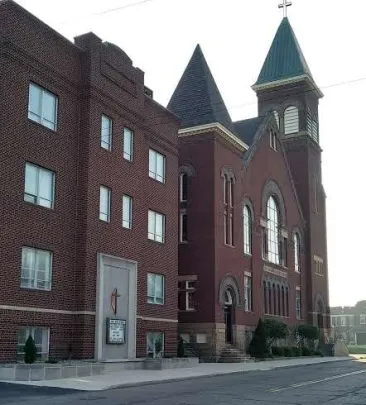
Genesis 24:34-38, 42-49, 58-67 Matthew 11:16-19, 25-30 Romans 7:15-25a
Throughout our lives we must decide in whom we will put our trust. When we are children, we trust our parents. In school, we often trusted our teachers. In college we trusted that the curriculum and all the agony that it put us through, would be useful and valuable to us upon completion. When we accepted employment, we put a lot of trust in the company that hired us, as well as the supervisors and managers that trained us and oversaw our work. And any of us who served in the military entrusted our lives to those persons who made our duty assignments and sent us to places down the street and around the world.
In recent weeks we have studied how Abraham was repeated tested by God. First God called Abraham to “go to a place that I will show you,” and then we read about Abraham’s conflicted emotions, and his trust in God, as he sent Hagar and Ishmael out into the wilderness, and then again when God tested his willingness to sacrifice his son Isaac. And those are just a few of the many examples from Abraham’s life. But, as we continue reading the story of Genesis, the family of Abraham continues to be tested by God. As Isaac matures to a marriageable age, his father worries that Isaac’s faith might suffer if he were to marry a Canaanite woman. And so, Abraham sends one of his trusted servants to go back to his home country, to find the descendants of the family that he left behind, and among them find a wife for Isaac.
It is almost certain that Abraham’s servant has never been to the place that he has been sent but he trusts that his master would not send him into great danger. At the same time, Abraham and Isaac trusted that this servant would be a good judge of character as his mission was, literally, to select the person with whom Isaac would spend the rest of his life. And so, in Genesis 24:34-38, 42-49, 58-67, the servant finds Abraham’s extended family, meets a girl, and this happens…
34 So he said, “I am Abraham’s servant. 35 The Lord has blessed my master abundantly, and he has become wealthy. He has given him sheep and cattle, silver and gold, male and female servants, and camels and donkeys. 36 My master’s wife Sarah has borne him a son in her old age, and he has given him everything he owns. 37 And my master made me swear an oath, and said, ‘You must not get a wife for my son from the daughters of the Canaanites, in whose land I live, 38 but go to my father’s family and to my own clan, and get a wife for my son.’
42 “When I came to the spring today, I said, ‘Lord, God of my master Abraham, if you will, please grant success to the journey on which I have come. 43 See, I am standing beside this spring. If a young woman comes out to draw water and I say to her, “Please let me drink a little water from your jar,” 44 and if she says to me, “Drink, and I’ll draw water for your camels too,” let her be the one the Lord has chosen for my master’s son.’
45 “Before I finished praying in my heart, Rebekah came out, with her jar on her shoulder. She went down to the spring and drew water, and I said to her, ‘Please give me a drink.’
46 “She quickly lowered her jar from her shoulder and said, ‘Drink, and I’ll water your camels too.’ So, I drank, and she watered the camels also.
47 “I asked her, ‘Whose daughter are you?’
“She said, ‘The daughter of Bethuel son of Nahor, whom Milkah bore to him.’
“Then I put the ring in her nose and the bracelets on her arms, 48 and I bowed down and worshiped the Lord. I praised the Lord, the God of my master Abraham, who had led me on the right road to get the granddaughter of my master’s brother for his son. 49 Now if you will show kindness and faithfulness to my master, tell me; and if not, tell me, so I may know which way to turn.”
58 So they called Rebekah and asked her, “Will you go with this man?”
“I will go,” she said.
59 So they sent their sister Rebekah on her way, along with her nurse and Abraham’s servant and his men. 60 And they blessed Rebekah and said to her,
“Our sister, may you increase
to thousands upon thousands;
may your offspring possess
the cities of their enemies.”
61 Then Rebekah and her attendants got ready and mounted the camels and went back with the man. So, the servant took Rebekah and left.
62 Now Isaac had come from Beer Lahai Roi, for he was living in the Negev. 63 He went out to the field one evening to meditate, and as he looked up, he saw camels approaching. 64 Rebekah also looked up and saw Isaac. She got down from her camel 65 and asked the servant, “Who is that man in the field coming to meet us?”
“He is my master,” the servant answered. So, she took her veil and covered herself.
66 Then the servant told Isaac all he had done. 67 Isaac brought her into the tent of his mother Sarah, and he married Rebekah. So, she became his wife, and he loved her; and Isaac was comforted after his mother’s death.
And so, not only did Abraham’s servant trust his master, and not only did Abraham and Isaac trust the servant, but Rebekah was asked to trust a man that she had just met, to leave her home, journey to meet a total stranger, whose family she had never met, so that she could get married and spend the rest of her life with them and almost certainly never see her parents, family, or friends, ever again.
That’s a lot of trust.
But trusting is hard.
And sometimes the people in whom you are asked to place your trust are not trustworthy. And that was, in large part, the situation that Jesus finds in the story of Matthew 11:16-19, 25-30. Although Jesus and the disciples were faithful Jews who attended services in the synagogues and observed the prescribed feasts and festivals at the temple in Jerusalem, Jesus also knew that following God was hard and not everyone had the faith of Abraham. And worse, Jesus knew that many times, the people who ran the Temple, and who led God’s people, were not the most trustworthy people. And in that story, Jesus speaks into the situation this way…
16 “To what can I compare this generation? They are like children sitting in the marketplaces and calling out to others:
17 “‘We played the pipe for you,
and you did not dance;
we sang a dirge,
and you did not mourn.’
18 For John came neither eating nor drinking, and they say, ‘He has a demon.’ 19 The Son of Man came eating and drinking, and they say, ‘Here is a glutton and a drunkard, a friend of tax collectors and sinners.’ But wisdom is proved right by her deeds.”
25 At that time Jesus said, “I praise you, Father, Lord of heaven and earth, because you have hidden these things from the wise and learned, and revealed them to little children. 26 Yes, Father, for this is what you were pleased to do.
27 “All things have been committed to me by my Father. No one knows the Son except the Father, and no one knows the Father except the Son and those to whom the Son chooses to reveal him.
28 “Come to me, all you who are weary and burdened, and I will give you rest. 29 Take my yoke upon you and learn from me, for I am gentle and humble in heart, and you will find rest for your souls. 30 For my yoke is easy and my burden is light.”
Jesus says that many of the people in that generation were like the children that demand that strangers play a game with them. Only they know the rules, they won’t explain the rules, and then they are angry that you didn’t play their game according to their rules. Jesus continues by explaining that the religious leaders of Israel have behaved exactly that way. They saw John refraining from food and drink, and they criticized him for doing so, but then Jesus came and did not refrain from eating and drinking, and they criticized him for that. Just like children in the marketplaces, the religious leaders of Israel were angry because John and Jesus had refused to play their games.
But Jesus also knew that many people really wanted to follow God and to have a good relationship with God, but the leaders of Israel had made the rules so confusing that it kept people up at night. The leaders had created a system of worship that was overly burdensome, time consuming, and still left people unsure of their standing before God. And into this confusion, Jesus says, ““Come to me, all you who are weary and burdened, and I will give you rest. 29 Take my yoke upon you and learn from me, for I am gentle and humble in heart, and you will find rest for your souls. 30 For my yoke is easy and my burden is light.”
Jesus says, “Following God, and having a good relationship with God is not as hard as you’ve been told. All that you need to do, is… trust me.” Trust me, and I will take away the burdensome rules and the sleepless nights. Trust me… and find… rest.
But Paul finds that even following Jesus can still be difficult. As we read just last week, Paul knows that even though we have grace and forgiveness because of Jesus’ sacrifice, we are not free to sin, but must still strive live a life of righteousness. But doing what is right can be hard. In Romans 7:15-25a Paul says…
15 I do not understand what I do. For what I want to do I do not do, but what I hate I do. 16 And if I do what I do not want to do, I agree that the law is good. 17 As it is, it is no longer I myself who do it, but it is sin living in me. 18 For I know that good itself does not dwell in me, that is, in my sinful nature. For I have the desire to do what is good, but I cannot carry it out. 19 For I do not do the good I want to do, but the evil I do not want to do—this I keep on doing. 20 Now if I do what I do not want to do, it is no longer I who do it, but it is sin living in me that does it.
21 So I find this law at work: Although I want to do good, evil is right there with me. 22 For in my inner being I delight in God’s law; 23 but I see another law at work in me, waging war against the law of my mind and making me a prisoner of the law of sin at work within me. 24 What a wretched man I am! Who will rescue me from this body that is subject to death? 25 Thanks be to God, who delivers me through Jesus Christ our Lord!
When we read these words quickly, we find that these might almost be unintelligible gibberish. But, if we slow way down, read slowly, think about what we’re reading, and consider the meaning, we can dig down into it and get a better sense of what Paul was trying to communicate. And, if we’re honest, this is how Paul intended it to be. This isn’t a comic book, or even a newspaper, that has all the imagery and ideas distilled down into their simplest form that we can skim over, past, and through with little effort and no intellectual engagement. These are transformational ideas that require the focus of our minds and spirits.
And, when we do that, we discover that Paul is saying several things that create a logical progression of thought. First, Paul says that he keeps doing the things that he doesn’t want to do, and so he agrees that the law is good because the law helps to keep him righteous. For example, we know, intellectually, that driving too fast is dangerous, but without speed limits, we will almost certainly do so. We might not always obey the speed limits, but that boundary helps us to be conscious of our speed and keep everyone on the road safer. In the same way, the boundaries given to us in the law help us to be righteous.
Second, after a lot of confusing language about what he wants to do in comparison to what he actually does, Paul concludes that because of the sin that lives inside of him, he is incapable of consistently doing good.
Simply put, we just can’t do it by ourselves.
But Jesus stands ready to walk with us, and to help us to do better and to overcome the natural evil that lives within us.
Like we saw with Moses, his servant, Isaac, and Rebekah, scripture repeatedly tells us stories about trust. Our relationship is built on our ability to trust in God.
Paul admits that trusting is hard, and that the sin and evil that is inside of us makes it impossible to be consistently good. We, like Paul, must admit that we simply cannot do it alone. We must surrender control, offer our lives as a living sacrifice to God, and trust Jesus to transform us into something better.
It is Jesus who says, trust me, and I will take away the burdensome rules and the sleepless nights.
Trust me… and find… rest.
Please LIKE and SHARE!
Click here to subscribe to Pastor John’s blog.
Click here if you would like to subscribe to Pastor John’s weekly messages.
Click here to visit Pastor John’s YouTube channel.
*You have been reading a message presented at Christ United Methodist Church on the date noted at the top of the first page. Rev. John Partridge is the pastor at Christ UMC in Alliance, Ohio. Duplication of this message is a part of our Media ministry, if you have received a blessing in this way, we would love to hear from you. Letters and donations in support of the Media ministry or any of our other projects may be sent to Christ United Methodist Church, 470 East Broadway Street, Alliance, Ohio 44601. These messages are available to any interested persons regardless of membership. You may subscribe to these messages, in print or electronic formats, by writing to the address noted, or by contacting us at secretary@CUMCAlliance.org. These messages can also be found online at https://pastorpartridge.com . All Scripture quotations, unless otherwise indicated, are taken from the Holy Bible, New International Version®, NIV®. Copyright ©1973, 1978, 1984, 2011 by Biblica, Inc.™ Used by permission of Zondervan. All rights reserved worldwide. www.zondervan.comThe “NIV” and “New International Version” are trademarks registered in the United States Patent and Trademark Office by Biblica, Inc.™



